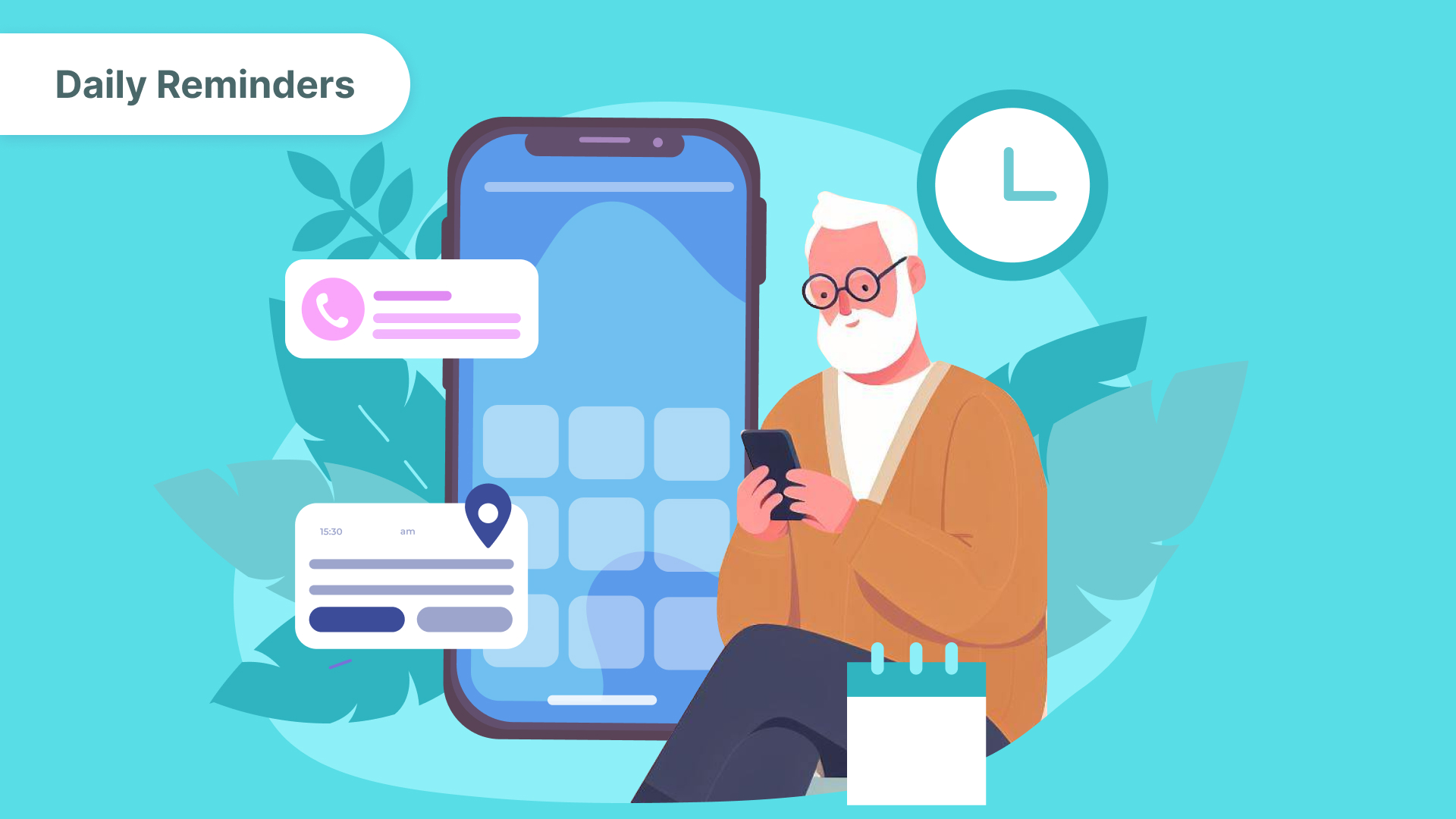

8 Ways Digital Health Apps Can Help People With Alzheimer’s
Alzheimer’s disease, a neurodegenerative condition affecting millions globally, poses significant challenges in memory, cognition, and daily functioning. As the world grapples with the rising prevalence of dementia, expected to reach 150 million by 2050, digital health technologies have emerged as a beacon of hope. These technologies, encompassing a range of apps and digital tools, promise to revolutionize Alzheimer’s care by offering innovative solutions for memory enhancement, cognitive training, and caregiver support.
However, the road to digital transformation in Alzheimer’s care is not without its challenges. While some apps show promising results in enhancing cognitive functions and aiding in daily life management, the overall effectiveness and user experience of many others remain under scrutiny.
This article explores eight key ways digital health apps are currently aiding Alzheimer’s patients and caregivers.
Memory Enhancement
Memory improvement apps, like Lumosity and CogniFit, offer a range of games and activities designed to boost cognitive functions. For instance, Lumosity’s memory games are based on neuroscientific research, aiming to improve working memory and attention span.
Pros: For many users, these apps have proven beneficial in enhancing short-term memory and overall cognitive function. They offer personalized experiences, allowing users to progress at their own pace, which can be particularly empowering.
Cons: However, it’s important to recognize the limitations. The effectiveness of apps can vary significantly among individuals, and in advanced stages of the disease, their utility may be limited. Moreover, reliance on digital devices might only sometimes be feasible for all patients, especially those who are not tech-savvy.
Cognitive Training
Cognitive stimulation tools, such as BrainHQ and Peak, provide exercises aimed at enhancing various cognitive skills. BrainHQ, for instance, offers exercises developed by neuroscientists to improve brain speed and attention.
Pros: The key advantage of these cognitive stimulation tools is their potential to slow down cognitive decline. Regular engagement with these exercises can help maintain mental faculties for longer, offering users a sense of control and independence. Additionally, these tools often provide a sense of achievement and can be a source of fun and engagement.
Cons: However, there are notable drawbacks. Consistency is crucial for these tools to be effective, and this can be a challenge for individuals with Alzheimer’s, who may struggle with routine. Additionally, as the disease progresses, the effectiveness of these tools can diminish, and they may not be suitable for all stages of Alzheimer’s. The digital divide also plays a role — not all patients have access to or are comfortable using technology-based solutions.
Daily Reminders

Apps like Medisafe and CareZone help Alzheimer’s patients manage daily tasks, including medication schedules. Medisafe, for example, uses visual and auditory cues to remind users about medication times, reducing the risk of missed doses.
Pros: The primary benefit of these reminder apps is their contribution to routine management. They provide independence to the patients by reducing their reliance on caregivers for day-to-day tasks. This not only empowers the patient but also alleviates some of the burden on caregivers.
Cons: The effectiveness of these apps, however, hinges on the patient’s ability and willingness to interact with technology. In cases where the disease has progressed, or in individuals who are not tech-savvy, these apps might be less effective. Furthermore, there’s a risk of becoming overly reliant on digital reminders, which could be problematic if there are technical issues or if the device is misplaced.
Medication Management
Alz Life and similar apps provide medication tracking and management specific to Alzheimer’s patients. They offer features like dosage tracking and refill reminders.
Pros: The most significant advantage of these apps is in reducing the risk of missed or double doses, a common issue for individuals with memory problems. This ensures better adherence to medication regimens and provides peace of mind for both patients and caregivers. The ability to track medication history is also beneficial for healthcare providers in monitoring the patient’s treatment.
Cons: However, these apps are not without their challenges. They require initial setup, which may be complicated for some users, and ongoing monitoring to ensure that the information remains current. In addition, technical issues like app malfunctions or device failures can disrupt the medication management process. There’s also the need for regular updates and potential privacy concerns regarding sensitive health data.
Caregiver Support
Apps like Lotsa Helping Hands and CaringBridge offer support networks for caregivers, providing platforms for coordinating care and sharing updates with family and friends. These apps help reduce caregiver stress and improve communication.
Pros: The primary benefit of these apps is the valuable information and support they offer. They can provide practical caregiving tips, help manage stress, and connect caregivers with local resources and support groups. This can significantly ease the burden on caregivers, offering them a much-needed outlet and a sense of community.
Cons: However, these apps may not be able to address all the challenges faced by caregivers. Each caregiving situation is unique, and an app might not provide solutions for every specific scenario. There’s also the risk of information overload or conflicting advice, which can be overwhelming for caregivers. Moreover, not all caregivers may have the time or inclination to engage with these apps, limiting their usefulness.
Behavioral Tracking
Carely and Moodfit allow caregivers to track behavioral changes in Alzheimer’s patients. By monitoring mood swings, agitation, and sleep patterns, these apps can help identify triggers and patterns in behavior.
Pros: The advantage of these Alzheimer’s tracking apps lies in their ability to provide real-time data on the patient’s behavior, aiding in the early detection of any worsening symptoms or new complications. This timely information can be crucial for healthcare providers to adjust treatment plans or interventions, potentially improving patient outcomes.
Cons: On the flip side, there are concerns about privacy and the accuracy of the data collected. Patients and their families may have reservations about being constantly monitored, raising ethical questions about consent and data security. Additionally, the interpretation of behavioral data requires expertise, and there’s a risk of misinterpretation or over-reliance on digital observations instead of personal interactions and assessments.
Social Engagement
Platforms like Elder connect Alzheimer’s patients with others for social interaction, helping to combat loneliness and isolation. These platforms offer valuable service tools that can help patients maintain contact with family and friends, fostering a sense of belonging and community.
Pros: The key advantage of these digital platforms is their ability to bridge the gap caused by physical distance or mobility issues. They can help patients remain part of their social circles, which is essential for mental well-being. Furthermore, for caregivers, these platforms provide a way to share updates and stay connected with other family members or caregivers in similar situations.
Cons: However, the effectiveness of these tools is limited by the patient’s comfort and familiarity with technology. For some, navigating digital platforms can be confusing or overwhelming. Additionally, these digital interactions are not a substitute for face-to-face contact, which is often more meaningful and beneficial for patients with Alzheimer’s. There’s also a risk of overreliance on digital communication, which might lead to reduced personal interactions.
Dementia Support
Apps such as MyTherapy offer educational content and tools for managing daily life with dementia. They provide practical tips and information encompassing everything from memory loss interventions to dementia support and offer a multi-faceted approach to Alzheimer’s care. They integrate various aspects of care management, from cognitive exercises to caregiver support, providing a more holistic solution.
Pros: The comprehensive nature of these apps means they can address multiple needs simultaneously, making them a valuable tool in the Alzheimer’s care arsenal. They offer flexibility, and personalization, and can be a source of empowerment for both patients and caregivers. By bringing together different aspects of care, these apps have the potential to improve the quality of life for those affected by Alzheimer’s.
Cons: However, it is critical to acknowledge that these apps are not a panacea. They should be viewed as supplements to, not replacements for, professional medical care and in-person support. Their effectiveness varies from person to person, and there may be issues with accessibility and usability, especially for older patients. Furthermore, the reliance on technology raises concerns about data privacy and the digital divide, potentially excluding those without access to these resources.
Final Word
While digital health apps offer innovative tools for managing Alzheimer’s, they are most effective when used as part of a broader care strategy that includes medical treatment, caregiver support, and personal interaction. The technology is a valuable adjunct, not a stand-alone solution, in the journey of Alzheimer’s care. But the goal is to enhance the care and quality of life for those living with Alzheimer’s, using every digital tool available.
Faq
How do digital health apps benefit individuals with Alzheimer’s disease?
Digital health apps for individuals with Alzheimer’s disease can offer memory aids, which help in recalling daily tasks and important events, thus reducing confusion and anxiety. They often include features for cognitive stimulation, like brain games, which can potentially slow the progression of cognitive decline. Additionally, these apps provide tools for caregivers to monitor and manage the patient’s health and activities, improving overall care and safety.
What are some specific features and functionalities offered by digital health apps for Alzheimer’s patients?
Digital health apps for Alzheimer’s patients often include features like memory games and cognitive exercises to help slow cognitive decline. They also frequently offer medication reminders and tracking systems for daily medical management. Additionally, many of these apps provide resources for mental health support and information to aid both patients and their caregivers in understanding and managing the disease.
Can digital health apps help in improving memory and cognitive functions in individuals with Alzheimer’s?
Yes, digital health apps can assist in improving memory and cognitive functions in individuals with Alzheimer’s. These apps often include exercises and activities designed to stimulate cognitive processes and memory retention. However, their effectiveness can vary, and they are typically used as a complementary tool alongside traditional therapies and treatments.
Tell us about your project
Fill out the form or contact us

Tell us about your project
Thank you
Your submission is received and we will contact you soon
Follow us
